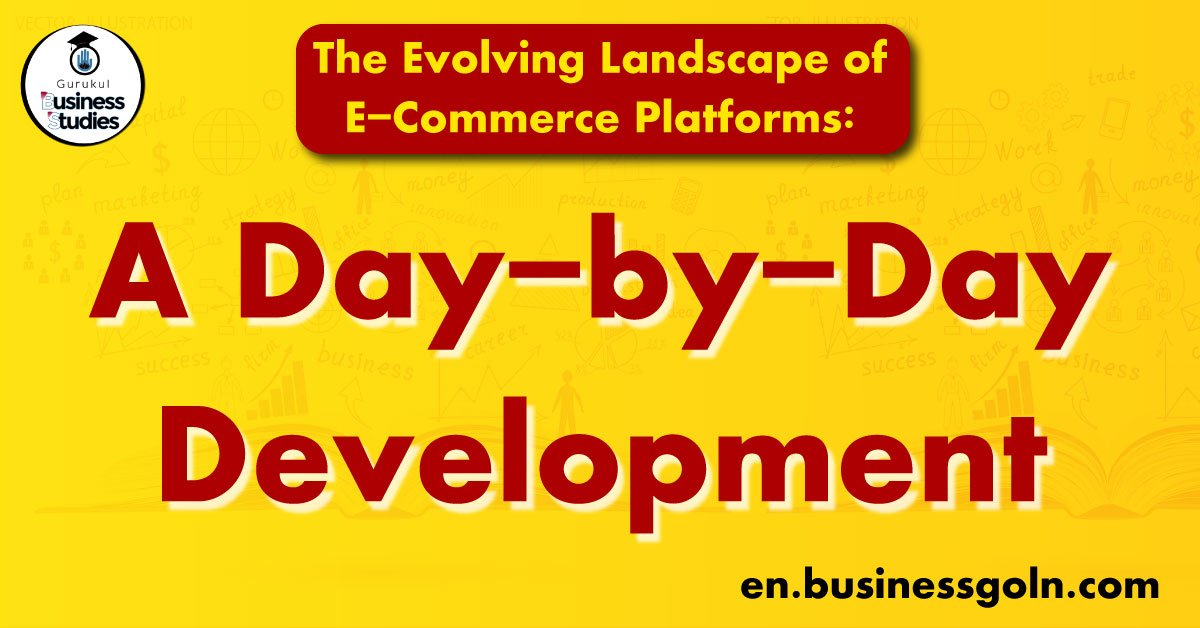The Evolving Landscape of E-Commerce Platforms: A Day-by-Day Development. In the ever-evolving realm of technology, e-commerce platforms stand as a testament to innovation and adaptation. With each passing day, these platforms undergo significant advancements, shaping the way businesses operate and consumers engage in online shopping. This article delves into the continuous development of e-commerce platforms, exploring the trends, challenges, and future prospects that define this dynamic industry.
The Evolving Landscape of E-Commerce Platforms: A Day-by-Day Development
Rapid Technological Advancements
The landscape of e-commerce platforms is propelled forward by rapid technological ‘advancements. From sophisticated AI-driven recommendation engines to seamless omnichannel experiences, technology plays a pivotal role in enhancing user engagement and driving sales. Real-time analytics, augmented reality (AR), and virtual reality (VR) are reshaping the online shopping experience, offering customers immersive ways to interact with products before making a purchase.
Personalization and Customization
One of the key trends shaping e-commerce platforms is the focus on personalization and customization. Today’s consumers expect tailored shopping experiences that cater to their preferences and needs. E-commerce platforms leverage data analytics and machine learning algorithms to deliver personalized product recommendations, targeted marketing campaigns, and dynamic pricing strategies. By understanding individual shopping behaviors and preferences, businesses can enhance customer satisfaction and drive conversion rates.
Mobile Commerce (M-Commerce) Dominance
The proliferation of smartphones and mobile devices has led to the dominance of mobile commerce (m-commerce) in the e-commerce landscape. As more consumers turn to their mobile devices for online shopping, e-commerce’ platforms are prioritizing mobile optimization and responsive design. Mobile apps offer streamlined shopping experiences, push notifications, and seamless checkout processes, driving increased engagement and sales on mobile devices.
Omnichannel Integration
Omnichannel’ integration is another prominent trend in e-commerce platform development. Businesses are increasingly adopting omnichannel strategies to provide a seamless shopping experience across multiple channels, including websites, mobile apps, social media platforms, and physical stores. Omnichannel platforms enable customers to browse products online, make purchases in-store, and access customer support through various touchpoints, fostering brand loyalty and engagement.
Enhanced Security Measures
With the growing prevalence of cyber threats and data breaches, e-commerce’ platforms are prioritizing enhanced security measures to safeguard customer data and transactions. Secure payment gateways, SSL encryption, two-factor authentication, and fraud detection systems are essential components of modern e-commerce ‘platforms. By instilling trust and confidence in their customers, businesses can mitigate risks and protect their reputation in the digital marketplace.
Challenges and Opportunities
Despite the numerous advancements in e-commerce platform development, several challenges persist. Competition is fierce, and businesses must continuously innovate to stay ahead of the curve. Technical complexities, scalability issues, and regulatory compliance pose additional challenges for e-commerce’ platforms. However, these challenges also present opportunities for growth and innovation. Emerging technologies such as blockchain, voice commerce, and social commerce hold the potential to reshape the future of e-commerce ‘platforms, opening up new avenues for businesses to connect with consumers and drive sales.
Future Prospects
Looking ahead, the future of e-commerce’ platforms appears promising. As technology continues to evolve, e-commerce’ platforms will become more intuitive, personalized, and immersive. AI-powered chatbots, voice-activated shopping assistants, and virtual shopping experiences are expected to become mainstream features of e-commerce ‘platforms. Furthermore, the globalization of e-commerce presents opportunities for businesses to expand into new markets and reach a global audience.
In conclusion, the development of e-commerc’e platforms is a continuous journey fueled by technological innovation, consumer preferences, and market dynamics. By embracing emerging technologies, prioritizing personalization and security, and adopting omnichannel strategies, businesses can navigate the evolving landscape of e-commerce and thrive in the digital age. As e-commerce ‘platforms evolve day by day, they continue to revolutionize the way we shop, connect, and transact in the digital marketplace.
